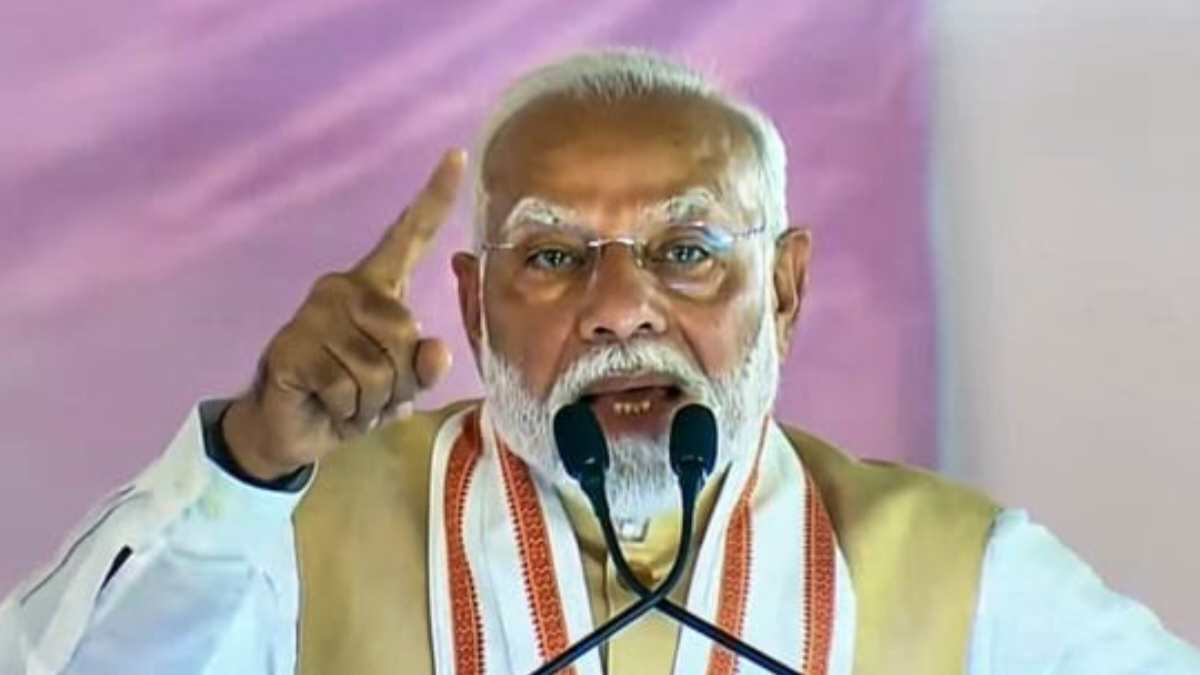In a recent rally in Dhule, Maharashtra, Prime Minister Narendra Modi launched a sharp critique of the opposition Maha Vikas Aghadi (MVA) alliance, calling it a “vehicle with no wheels or brakes” and highlighting the constant infighting among its leaders. The prime minister’s remarks came as part of the BJP’s campaign for the upcoming Maharashtra state assembly elections, scheduled for November 20. Addressing a large gathering, Modi took aim at the lack of unity and direction within the MVA, emphasizing that the BJP-led Mahayuti alliance was the only group capable of ensuring Maharashtra’s continued progress.
PM Modi Mocks MVA’s Infighting
Prime Minister Modi’s criticisms of the MVA were scathing as he mocked the alliance’s internal discord. He likened the MVA to a dysfunctional vehicle, stating that it lacked both wheels and brakes and was embroiled in constant squabbles over leadership. “The vehicle of Maha Aghadi has neither wheels nor brakes. And there is continuous fighting to take the driver’s seat,” Modi said. He further emphasized the chaos within the alliance by describing how, from all directions, different voices were rising, and the sound of horns blaring was overwhelming.
This pointed analogy was meant to underline the internal struggles within the MVA, which is a coalition of the Shiv Sena (Uddhav faction), the Nationalist Congress Party (NCP), and the Indian National Congress (INC). These three parties, although united in opposition to the BJP, have frequently faced tensions and disagreements, particularly over leadership roles, which Modi seized upon to undermine their credibility as a viable alternative to the BJP.
BJP Promises Continued Progress for Maharashtra
Turning the focus to his own party’s achievements, Modi assured the people of Maharashtra that under the BJP-led Mahayuti alliance, the state would continue to thrive and progress. He stressed that in the last two-and-a-half years, Maharashtra had seen rapid development, and this momentum would not be allowed to halt. Modi argued that the BJP’s governance model prioritized the welfare of the people and would ensure sustained development in the state, especially in critical sectors like infrastructure, healthcare, and education.
“We view the people as a manifestation of God, and it is our priority to serve them. Unfortunately, some parties are only in politics for personal gain, seeking to exploit the public for their own benefit,” Modi remarked. The prime minister’s rhetoric sought to position the BJP as the protector of the common man’s interests, in stark contrast to the opposition parties, whom he accused of corruption and self-interest.
Allegations Against Congress and Historical Anti-OBC Policies
In his address, Modi also took aim at the Congress party, particularly its historical policies regarding reservation and social justice for marginalized communities. He alleged that key decisions made by past Congress leaders, including Pandit Jawaharlal Nehru, Indira Gandhi, and Rajiv Gandhi, had been detrimental to the OBC (Other Backward Classes) and tribal communities. According to Modi, these decisions were part of a broader scheme to undermine the rights and opportunities of these communities, especially through anti-reservation measures.
“A dangerous game is being played by the Congress,” Modi asserted, “by pitting one caste against another. This is a party that can never see Dalits, backward classes, and tribals progressing.” The prime minister’s criticism was aimed at highlighting the Congress’s alleged failure to uplift these communities, positioning the BJP as a party that genuinely cares about their advancement.
Modi’s comments reflect the BJP’s ongoing effort to consolidate support from the OBCs, Dalits, and tribals, who form a significant portion of Maharashtra’s electorate. His rhetoric sought to frame the Congress as being out of touch with the needs and aspirations of these communities, portraying the BJP as their true advocate.
BJP’s Focus on Women’s Security and Empowerment
Another key part of Modi’s address was his announcement regarding women’s security and empowerment. He pledged that if the Mahayuti government were elected, it would recruit 25,000 women into the police force to ensure greater security for women and create job opportunities. This promise was part of the BJP’s broader agenda to empower women and make the state a safer place for them.
The prime minister emphasized that the recruitment of women into the police force would not only enhance security but also provide employment opportunities in a sector that has traditionally been male-dominated. This initiative, Modi said, would also set a precedent for other states to follow, reinforcing the BJP’s commitment to women’s welfare.
Criticism of the Ladki Bahin Scheme
In contrast, Modi criticized the Congress-led MVA for planning to cancel the Ladki Bahin scheme if they came to power. The Ladki Bahin scheme, which provides financial assistance to women in Maharashtra, has been a cornerstone of the state government’s social welfare initiatives. Modi accused the opposition of undermining this pro-women initiative, suggesting that the MVA’s policies were not in line with the needs of women and would ultimately harm their progress.
The BJP’s emphasis on women’s empowerment, including initiatives like the Ladki Bahin scheme, is likely to resonate with female voters, particularly in rural areas, where financial assistance and security are crucial concerns. By drawing a contrast with the MVA’s stance, Modi sought to portray the BJP as the party best suited to address women’s issues.
Conclusion: A Battle for Maharashtra’s Future
As Maharashtra approaches its state assembly elections, the battle between the BJP and the MVA has become increasingly heated. Modi’s rally in Dhule was a key moment in the BJP’s campaign, as the prime minister sought to highlight the opposition’s internal divisions and underscore the achievements of his government. With promises of continued development, women’s empowerment, and a strong stance on social justice, Modi aimed to position the BJP as the party of the future for Maharashtra.
The MVA, for its part, will need to address these criticisms and present a united front if it hopes to challenge the BJP’s dominance in the state. As the election date nears, both alliances will likely intensify their campaigns, each aiming to win over the hearts and minds of Maharashtra’s electorate.
